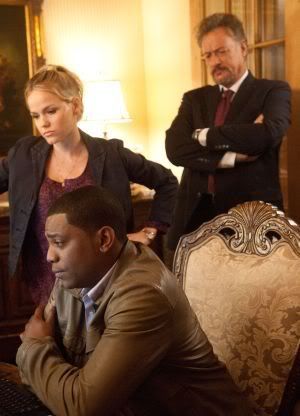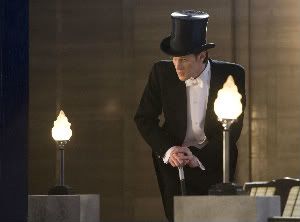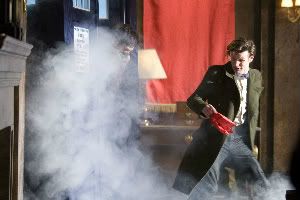Doctor Who: Night Terrors

Doctor Who: Series Six - Night Terrors
Written by Mark Gatiss
Directed by Richard Clark
Broadcast on BBC1 - 3rd September 2011
In an episode all about multiple fears, and where the Doctor ponders whether young George suffers from pantophobia, it’s tempting to frame this review by referring to different phobias, both real and invented. With that in mind, perhaps this story will offer a cure for Gatissophobes still traumatised after Victory of the Daleks, though given its array of alarming lifts, nasty dolls, and recurrent darkness, it certainly won’t make comfortable viewing for phobophobes.
Gatiss has said that his brief was to make the contemporary scary, as per his excellent Crooked House. That, however, used portmanteau horror to give its present-day setting an overlaid creepiness, whereas this tale doesn’t have the luxury of different time periods and historically lingering spookiness to realise its threat. Instead, we jump straight into a repertoire of childhood anxieties, superbly realised via director Richard Clark’s use of shadows and complemented by a themed colour palette combining inky blues with sickly yellow-greens.
Since he is ostensibly a child of our time, I kept expecting George to have a remote-controlled Dalek or a collection of Character Options toys in his room: Bergerac exists in this universe, but not a television series called Doctor Who. Incorporating such visuals would have made this both more realistic and yet less real-seeming at the same time; a fiction pointing out its own fictional status. We are shown an Amy action figure, of sorts, in the form of her dolled-up version, but the episode resolutely avoids branded toys so that George’s collection of non-copyright-infringing, non-product-placement robots, dinosaurs, and themed wallpaper still end up looking like a strange, out-of-time BBC unreality. Despite refusing to permit any ‘meta’ appearances of Doctor Who toys, an episode centred on a scared child cannot resist referencing debates which have whirled through the series’ history: “may be… things on telly… scary stuff” should be blamed for George’s nervous state. It’s a knowing wink to the audience, but played lightly and without disrupting the story’s world.
This was one of the series six episodes produced by Sanne Wohlenberg, and though I’d not have a critical word to say about Marcus Wilson’s excellent work, this bears all the hallmarks of a very tightly, skilfully produced ep where key elements knit together well. Given the focus on paternity, and on Alex’s love for his son, Emma Cunniffe as Claire is rather underused, though Daniel Mays doesn’t put a foot wrong throughout and Andy Tiernan plays the sort of character his physiognomy seems doomed to enact – Purcell, a caricatured landlord, complete with Bernard the bulldog (surely a sly Quatermass reference from Gatiss).
Rituals are vital here, whether it’s switching lights on and off, putting fears away in the cupboard, or repeating phrases such as “please save me from the monsters”. Ritual holds and contains anxiety, and this theme is artfully reflected in Clark’s use of shots split up into angular sections; the housing estate which seems to box in its inhabitants; the serving hatch through which we observe Alex and the Doctor; doors and windows which frame various residents, and even the pile of bin bags which encloses Mrs Rossiter in a menacing reverse shot. Everything is constantly framed, bounded, and visually hemmed in, implying that characters may themselves have become shut in with what’s feared. And the episode’s editing also becomes almost ritualistic or incantatory at times, such as in the intercutting of slammed doors – wham, wham, wham! – on the Doctor, Amy and Rory.
Night Terrors poses a simple enough question: what can overcome a child’s fear? And the answer is an emotional one rather than a wodge of technobabble. Stories are one place of safety, such as ‘The Emperor Dalek’s New Clothes’ or the ‘Three Little Sontarans’. But even more powerful than storytelling is unconditional parental love: Alex is willing to embrace ‘his’ child, no matter what. This gives the tale an emphasis on human feeling that has always been at the heart of Who since its 2005 return, but it also feels a little off-kilter here. For one thing, why is the maternal so strongly written out of proceedings, as if Doctor Who’s natural constituency should involve focusing on a father-son relationship? And then there’s the matter of George’s alien identity as a cuckoo in the nest. Conveniently glossed over by the notion that he will adapt perfectly to life among humanity – i.e. he’s alien, but from now on, imperceptibly so – this seems all too rapidly and easily dealt with. Is Alex supposed to sit Claire down for a “by the way, dear, our sense of reality has been modified and we actually have an unearthly child” sort of chat on the sofa? Ironically for an episode about ritual, the ending feels rather ritualistic and by-the-numbers itself, observing the convention of contemporary Doctor Who that love and monsters are needed.
Always visually compelling, this is generally atmospheric rather than downright scary, treading a fine line for the family audience. And as for those watching from behind the proverbial sofa, well, perhaps it’s just that Doctor Who’s viewers exhibit an unusually high level of cathisophobia.




 As usual with Doctor Who, it is so easy to be taken along for the ride from beginning to end, and the cracks in the plot are easily plastered up by the sheer pace and display put on. One crack in particular that stuck out for me was quite how Mels ended up where she was. We see the young Melody regenerate into her at the end of Day of the Moon ... but this was in 1969(ish) and River says she only changed this once, so how did a young black girl get from New York City to Leadworth, not to mention being "born" at least couple of decades before her parents? Time Lords (should we call her that?) may age differently from humans, but then she seemed to match up with them rather well. Mind you, this could be a previously unknown facet of Time Lord physiology that they can control how they age (possibly borne out by an aside by River on getting younger tonight?).
As usual with Doctor Who, it is so easy to be taken along for the ride from beginning to end, and the cracks in the plot are easily plastered up by the sheer pace and display put on. One crack in particular that stuck out for me was quite how Mels ended up where she was. We see the young Melody regenerate into her at the end of Day of the Moon ... but this was in 1969(ish) and River says she only changed this once, so how did a young black girl get from New York City to Leadworth, not to mention being "born" at least couple of decades before her parents? Time Lords (should we call her that?) may age differently from humans, but then she seemed to match up with them rather well. Mind you, this could be a previously unknown facet of Time Lord physiology that they can control how they age (possibly borne out by an aside by River on getting younger tonight?).







